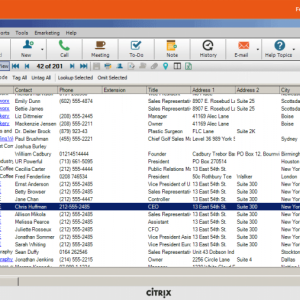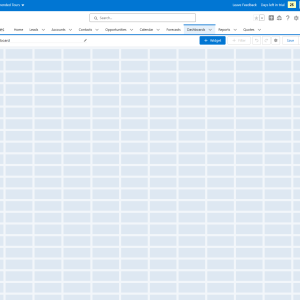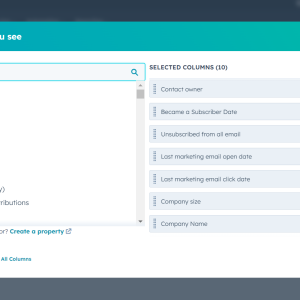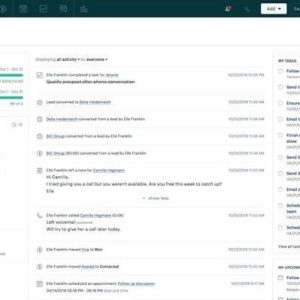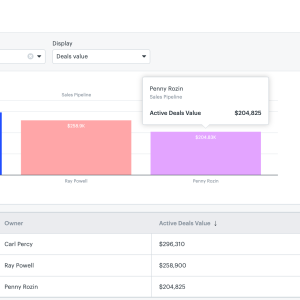Zoho and Salesforce are two prominent customer relationship management (CRM) software providers that offer a range of innovative solutions to help businesses manage their customer interactions and improve overall efficiency. Both platforms offer a wide array of features and capabilities, making it challenging for businesses to decide which option is best suited for their specific needs. In this article, we will compare and contrast Zoho and Salesforce, exploring their key features, pricing models, and customer reviews, to determine which CRM software is the best choice for businesses looking to streamline their customer management processes.
Both have their merits, but according to our research, Zoho is better than Salesforce thanks to its massive feature catalog and general affordability for businesses of all sizes. Salesforce remains an excellent choice for larger businesses, though, offering lots of scalability and robust data analytics.
You are viewing: Zoho vs Salesforce: Which CRM Software Is Best?
If your business is deciding on which CRM platform to use, both providers have their pros and cons, as is the case with most of the industry. You’ll want to have a good idea of what’s important to your business, like number of features or price, before making a decision.
Let’s take a closer look at both platforms below, and don’t forget you can compare Salesforce, Zoho, and other CRM platforms with our helpful comparison tool to get the right price for your business.
Of course, these aren’t the only CRM tools to consider. Check out some of these further alternatives, below. Or, scroll on to learn more about Salesforce and Zoho.
The question really isn’t if Zoho CRM or Salesforce are the best choice, but whether either of them is the right fit for you. A good way to discover a CRM that can be customized for your needs is to use our handy CRM Quotes Tool to receive tailor-made, zero-obligation CRM cost quotes, which take into account your company’s individual needs and scale.
Zoho CRM vs Salesforce: Quick Fact File
Deciding between Salesforce and Zoho CRM isn’t easy, because both are decidedly respectable options in their field. They both offer a lot of helpful pros that can help you run your business, but also feature some notable cons that could be a deal-breaker:
- Zoho CRM is better for smaller businesses than Salesforce
- Salesforce offers more scalability than Zoho CRM
- Zoho CRM is easier to use than Salesforce
- Salesforce offers more customization opportunities than Zoho CRM
- Zoho CRM offers a free plan and Salesforce does not
- Both Salesforce and Zoho CRM have excellent customer support
Zoho CRM vs Salesforce: Software Comparison
When it comes to deciding which CRM is best for you, there’s a lot to consider. Features, functionality, ease of use, integrations, scalability, and of course price. Below, we’ll match these two CRM up against each other on all of those, so you can get the best information for your business.
Best for Ease of Use: Zoho CRM
Looking at both services from an ease-of-use perspective, there’s no question that Zoho is the best CRM example in this face-off.
Salesforce has a ton of features and options to tweak. The basic categories are easy enough to understand, but there are many ways to customize the service and many extra features to explore – not to mention a thriving third-party app marketplace.
Zoho is more straightforward, with a cleaner look and about the same number of menu tabs as Salesforce. Zoho’s third-party integrations aren’t as deep as Salesforce, but if you’re looking for simplicity, then that may be less of an issue unless there’s a particular third-party tool you absolutely must use.
We tested both platforms for usability. Our research found that the experience of completing basic actions such as managing contacts and sales pipelines was largely similar between the two. However, Zoho had a far better onboarding experience which only took 17 minutes whilst SF took 35 minutes due to a more complicated data import process.
Best for Integrations: Salesforce
Contacts is a key section for any CRM, and both Salesforce and Zoho cover the basics here. Zoho, however, has some nice integrations that are available by default – the key one being if a salesperson adds their Twitter or Facebook account, and then adds the corresponding social account for their contacts, they can view their contacts’ social activity within Zoho’s CRM. This is a great feature if you run a business where most of your interactions happen on social media.
Salesforce can do something similar with a lot of powerful tools for social media monitoring, but it requires Marketing Cloud, which is a service beyond Sales Cloud, Salesforce’s basic CRM. Plus, with Salesforce and Microsoft teaming up, you can seamlessly add functionality to the platform through Microsoft Teams.
See more : Salesforce Marketing Cloud Account Engagement Pricing
Additionally, Salesforce has announced a few great add-ons that could really bolster your online offering. For one, Salesforce Anywhere is the company’s answer to the pandemic, offering a team collaboration platform that allows for real-time messaging and document sharing for remote workers. It has also announced that its new analytics platform is called Tableau and offers aa 360-degree view of customer interactions to give you all the information you need.
Overall, we give the advantage to Salesforce due to the massive number of web conferencing and VoIP integrations available through the platform. During a pandemic that has seen increasing numbers of employees working from home, the ability to remotely communicate with team members is more important than ever.
Best for Scalability: Salesforce
When it comes to scalability, it’s hard to beat Salesforce. The company has become the most popular CRM on the planet by quite a large margin, mostly due to the fact that it can scale up with large businesses, no matter how many sales they make. Zoho CRM, on the other hand, is an excellent choice for small businesses because it offers a lot for the price, but it doesn’t offer some of the customizability that Salesforce does, which can be key for larger organizations.
One of the factors that contributes to Salesforce’s scalability is its team infrastructure features. While both Zoho CRM and Salesforce offer tools like team and use hierarchies, team dashboards, and individual targets, Salesforce allows for unlimited access, while Zoho CRM puts limits on the number of roles you can track, depending on the plan.
All in all, both CRM options here are well equipped for scalability, with Salesforce (4.7/5) and Zoho CRM (4.5/5) scoring the highest marks in the category for our research. Still, Salesforce slightly has the edge because of its unlimited status at the enterprise level.
Best for Features: Zoho CRM
We found that Zoho CRM not only has more features than Salesforce, but actually has more features than any CRM across our research. With a score of 4.4/5, Zoho CRM beats out Salesforce (3.5/5) quite heartily, and it’s largely due to its lead capture features for sales businesses.
You’ll find social listening, website visitor tracking, and web form functionality with Zoho CRM, whereas Salesforce only offers web forms built in and social listening as a paid for add-on. Zoho CRM also offers lead communication features that Salesforce doesn’t, but you’ll have to pay for the Plus plan. Luckily, thanks to Zoho CRM’s affordable pricing, that’ll only run you $57 per user, per month, which is well below Salesforce’s comparable plans.
All in all, both CRM platforms offer more than enough features to get by, but Zoho CRM goes that extra mile to provide helpful features across its plans. Plus, with affordable enterprise level plans, you can get access to advanced features at a lower price, which is why we gave Zoho CRM the edge when it came to features.
Zoho CRM Pricing vs Salesforce Pricing
One important difference between Zoho CRM and Salesforce is the price. While Salesforce is on the more expensive side — for good reason given the massive selection of features, analytics, and support — Zoho CRM caters to more budget-conscious businesses with lower prices that make it a bit more accessible. Still, the lower price comes with less functionality, so be sure to check on how that could affect your business.
Below, we’ve compared Zoho CRM and Salesforce pricing to give you a better idea of how much these platforms actually cost.
Salesforce CRM Pricing
Because Zoho CRM is a sales-focused option, we’re going to focus on the Salesforce Sales Cloud pricing here. It starts with the Essentials plan, which despite the low price compared to other plans actually still offers a lot. You still get all the robust data analytics and support options, and only take a hit in certain advanced lead capture, communication, and conversion categories.
After that, the Professional, Enterprise, and Unlimited plans really open the door to more advanced features, namely in lead communication and conversion. Additionally, you’ll get much more advanced infrastructure features, which can help you organize your team for better success.
Take a look at how these plans compare below and check out our Salesforce pricing guide for more information.
Zoho CRM Pricing
Zoho also has a wide range of pricing plans. The software starts with a great free plan service for up to three users that includes its basic CRM. After that, Zoho CRM offers five different pricing plans: Standard, Professional, Enterprise, and Ultimate.
The Standard plan is quite affordable but offers notably less than Salesforce’s Essentials plan even. You’ll miss out on a lot of lead-based features, as well as a few key data visualization options. Still, it’s a great starting point if the free plan isn’t cutting it for you.
See more : Best CRM Software to Easily Manage Customer Databases
The Professional plan is the one we recommend for most businesses. It’s still affordable while bringing more advanced features into the fray, most notably when it comes to lead conversion. Plus, you get a lot more infrastructure features, so you can keep track of your team more effectively.
The Enterprise and Ultimate plans are, as you can imagine, aimed at larger businesses. In this case, we recommend Salesforce over these, as it’s more geared to enterprise-level organizations. But if you’re already set up with Zoho, you might find this a better fit.
Zoho CRM also offers a unique Plus plan, which combines a wide range of other Zoho apps into one platform and costs $57 per user per month. The all-in-one hub allows for sales, marketing, and help desk functionality, as well as access to advanced analytics, social media integration, and project management features.
Take a look at how these pricing plans compare below and check out our Zoho CRM pricing guide for more information.
Helpdesk: Zoho Desk vs Salesforce Service Cloud
While Zoho and Salesforce are great for sales-focused businesses, both providers also offer customer service CRM options that can make handling your business that much easier. Learn more about the features and pricing options of Zoho Desk and Salesforce Service Hub below:
Zoho Desk
Zoho Desk was the third best CRM we researched for customer support, netting an overall score of 4.5/5 thanks to excellent affordability and plenty of features for service, team infrastructure, and customizability.
Zoho Desk provides one of the affordable CRMs for customer support — starting at $14 per user, per month — that is geared towards small businesses. You’ll get a lot of customer service features, although it is lacking a bit when it comes to customer feedback and the number of communication channels you can take advantage of.
Still, Zoho Desk provides great ticketing channels, plenty of contact focused features, and a lot of data so you can hone your strategy a bit more effectively. Here are a few pros, cons, and screenshots to get a better idea of how these customer service-focused CRM operates.
Salesforce Service Cloud
Salesforce is ideal for sales businesses, as the name implies, but it also offers a wide range of other options, and the Salesforce Service Cloud is the one of best for customer service-focused companies. While it isn’t our favorite CRM for customer service — an honor that goes to Zendesk — it definitely holds its own for larger businesses in need of a robust option that costs a bit extra — specifically $25 per user per month.
Our research found that Salesforce Service Cloud is the fourth best in our research, netting an overall score of 4.3/5, which puts it within spitting distance of Zoho CRM, which we mentioned is in third place. Salesforce Service Cloud offers excellent features, substantial customization, and unmatched team infrastructure features, but the price makes it too intimidating for smaller businesses.
Take a look at some pros, cons, and screenshots of Salesforce Service Hub to get a better idea of what you’re in for with this platform.
Zoho CRM and Salesforce for Small Business
Any small business looking at these two CRM platforms first has to consider the onboarding process. If you just want to get up and go, then Zoho is probably the better option. It’s easier to understand, and the interface is less intimidating. Zoho also specializes to a certain degree in small businesses, though there are tools for enterprises as well.
In fact, our research found that Zoho CRM is the best CRM for small businesses, which is definitely saying something. It received an overall score of 4.7/5 in our research, thanks to an excellent ease of use score and plenty of feature availability at low price points. Conversely, Salesforce netted a score of only 4.3/5 overall, mostly due to the majority of valuable features only being available in more expensive pricing plans.
If neither of these is appealing to you because you’re a really small business, you’re in luck! Zoho Bigin is the company’s extra small business option that can save you a bit of money while providing you with a stripped-down CRM that can handle your needs.
About Our Research
At Hiddenshard, we take the comparison of business software quite seriously. We don’t just rate and rank based on random factors, but instead we spend hours doing in-depth, independent research on everything a potential user might want to know before inputting their credit card information. The goal is to ensure that you have the most valuable information to make a decision for your business.
For CRM, we’ve done extensive research on the top providers, from Salesforce and Zoho to HubSpot and Freshworks, measuring metrics like features, pricing, customization, support and help, and scalability, so you know that you are getting the best of the best when it comes to CRM software.
Frequently Asked Questions
However, we think that Salesforce might be a better choice as it scales better with growing companies.
That’s a wrap on “ Zoho vs Salesforce: Which CRM Software Is Best? ” We hope you’ve found a trove of useful insights and fresh perspectives. Your opinions and ideas matter to us—join the conversation below and share your take! Hungry for more tech insights? Dive into our diverse collection of articles where innovation meets practicality. Discover More CRM Softwares.
Stay in the loop with the latest in AI and tech – your journey into the digital future continues at hiddenshard.com.
#Zoho #Salesforce #CRM #Software
Source: https://hiddenshard.com
Category: CRM
